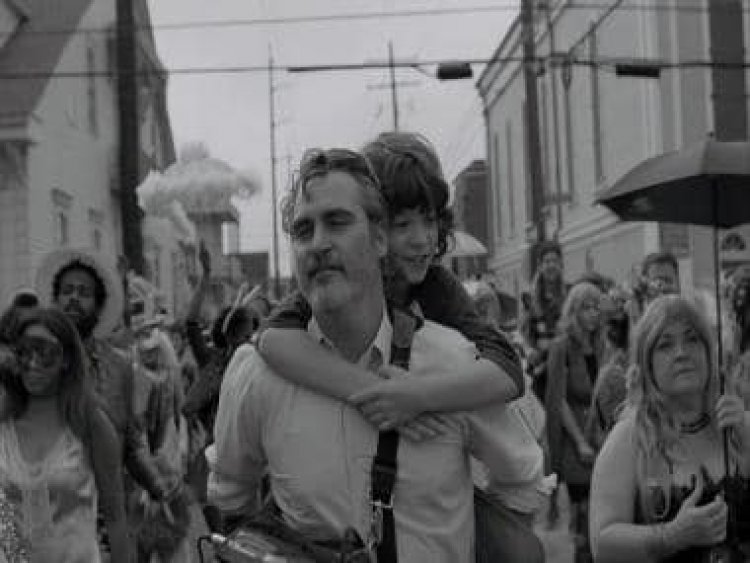C’mon C’mon adds a new dimension to the coming-of-age genre
C’mon C’mon adds a new dimension to the coming-of-age genre

In a scene from Mike Mills’ C’mon C’mon, Jesse played by the young Woody Norman asks his uncle about abortion and leaves him stumped. His uncle Johnny, played by a terrific Joaquin Phoenix is perplexed, hopelessly inarticulate in response. Quite incredibly, Johnny is on a road-trip across America to capture the opinions of young Americans about a variety of things including the country’s future. An unassuming, often subtly disarming film, C’mon C’mon deals with adulthood via the innocence of its children. Johnny is on a journey to discover America’s young heart and in response, has his own somewhat changed and touched by his nephew Jesse. It’s a film that is about listening, about opening your ears to the world, and god knows it is prescient in the context of today’s socio-political landscape.
The film follows both Jesse and Johnny as they bond, after the former has been left at the behest of his uncle. Jesse’s parents are in a difficult marriage, and his mother has to tend to a mental health emergency from which Jesse must be sheltered. It’s his father, a near silent, yet memorable little cameo by the wonderful Scoot McNairy. Johnny is a single, radio journalist, somewhat ponderous and yet outdated in a definitive sort of way. In one scene he prevents Jesse from spending too much time on his phone as they eat at a restaurant. Johnny is indulgent, evident by his rather aimless solitary confessions, but he gradually opens up listening, not just for professional reasons, but for personal as well. Kids all kinds of age, race and colour answer Johnny and his team’s questions to fascinating effect.
Though Phoenix is the heavyweight star on show here, it’s really Norman’s film. Coming-of-age cinema has sped its alliterative view of life in recent years (The Florida Project etc) and here there is distinct intellectualism on display. Jesse’s self-awareness is infectious, even odd at times when he articulates to near perfection his state of mind. “Don’t you have trouble expressing your emotions”, he asks his uncle in one scene. The kid admits that he is a product of hanging out with adults. “Nobody really talks like me,” he tells Johnny in what is an eerie expression of maturity. It’s uncanny, but also indicative of the way children have grown up in cinema.
Throughout the film, Johnny’s subjects address a variety of issues like race, climate change, gentrification, mental health and more. It’s a way to alluding to the wonders of adolescence, the perceptive nature of children who, beyond servicing approaching adulthood, hang onto liberalism by other means. They do not hide or hold back, neither are they militaristic or loud in the way they propagate ideas. They quietly convey their opinion, and the sheer elegance and restraint on show is perhaps the echo of an America that nobody is possibly listening to. It’s the America that wants guns abolished, rights to minorities restored, wars cancelled and inclusivity made a priority. It’s an America that hasn’t yet failed the American dream even if the dream has somewhat begun to fail them. Listening, in this context, is the film’s coded message. Jesse spends the entirety of the film, not answering questions, but capturing the sounds of the city. Maybe he knows more than anyone else.
The black and white tone of the film declutters it to an extent. It quietens the sensuality of the coming-of-age space and gives the film a more innocent look if you like. And sure, C’mon C’mon is intuitive in a more obvious kind of way, but it does have its way of reaching across the aisle and tugging you into its story. It helps then that Phoenix plays a marginally dysfunctional adult who is neither boisterous nor overly aggressive. “Can you not like act normal”, he asks his nephew to which Jesse responds by asking “What’s normal?”. Johnny is flustered and frustrated at various junctures in the film but never on the cusp of violence or incredulity. His curiosity guides him and it is a form of masculinity that guides difficult, often awkward conversations towards some sort of inner catharsis.
C’mon C’mon is about many things, inter-generational relationships, the American youth and the growing propensity among the world’s adults to not listen to their children. It’s also about the perception of maturity, of how we tend to assign experience, far more credibility than it might actually deserve. In C’mon C’mon there are questions about the future, but what is really transformative is the teachings of the present. The dynamic between a hapless uncle and his eccentric nephew forms the genesis, but it’s the broader message that quietly filters through. The message that lessons in life can come from anywhere.
C’mon C’mon is now streaming on BookMyShow Stream
The author writes on art and culture, cinema, books, and everything in between. Views expressed are personal.
Read all the Latest News, Trending News, Cricket News, Bollywood News,
India News and Entertainment News here. Follow us on Facebook, Twitter and Instagram
What's Your Reaction?



























































